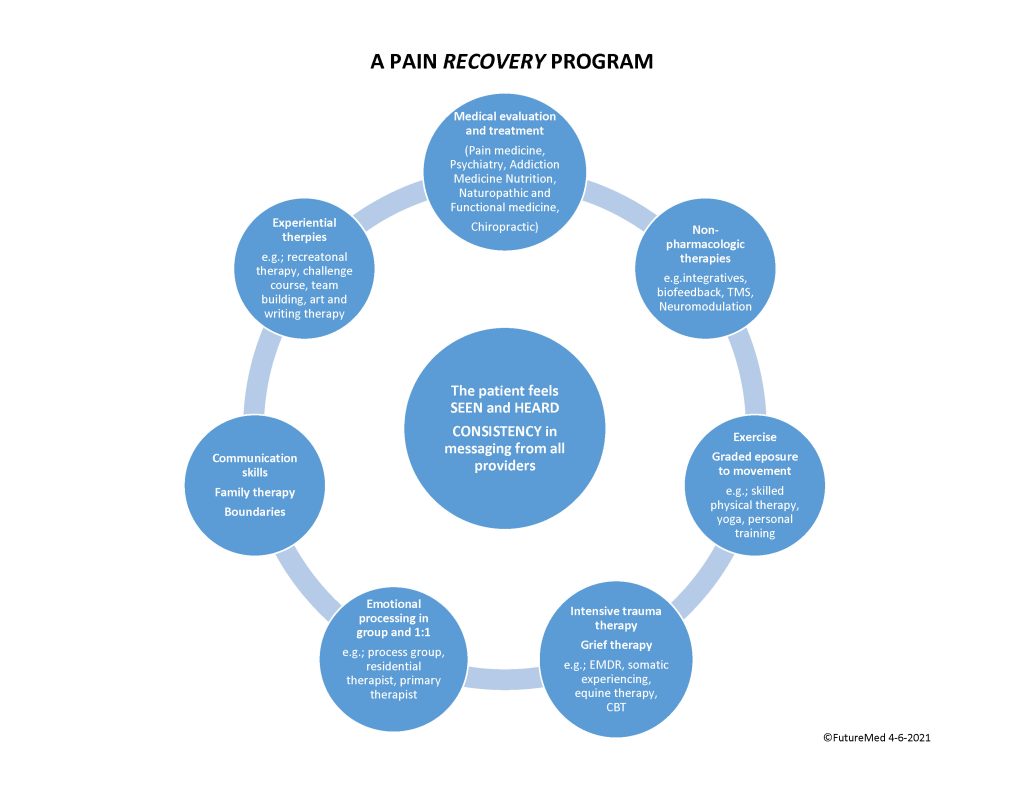At Sierra Tucson, we treat the entire you — not just the part that hurts. We provide a comprehensive residential treatment program that is focused on pain recovery, not just pain management. Our evidence-based Pain Recovery Program is designed for people who have chronic pain that is interfering with their life and is not getting better despite treatment efforts. The program is led by a team of professional and compassionate clinical and medical pain experts who understand that chronic pain affects a person’s mind, body and spirit.
Improving the Quality of Life
The goal of our program is recovery. At Sierra Tucson, we successfully combine behavioral health treatment and traditional pain management to improve your quality of life. We spend the time and effort necessary to understand each patient’s unique circumstances, history, goals, strengths and weaknesses, and the medical and behavioral health conditions they are suffering from. This often means communicating with the medical and behavioral health providers who are currently working with a patient and doing additional medical testing and evaluations, but it also means that we engage a team of medical, behavioral health, psychology, psychiatric, physical medicine, alternative and complementary medicine experts to work with our patients — and we all talk to each other.

Pain Treatment
Sierra Tucson believes that the secret to success includes combining the following in the right way based on what each patient needs. We have developed our Pain Recovery Program based on medical evidence and feedback from our patients. In general, the key elements we offer include:
- A safe, supportive healing environment
- Collaborative care that includes medical, behavioral, physical medicine, alternative medicine, behavioral health, nutrition health and nursing professionals working as a team
- A healing community: Patients have the opportunity to connect with and learn from each other
- Psychiatric medication reevaluation and management as needed
- Pain medication reevaluation and management as needed
- Office-based pain procedures as needed
- One-on-one therapy for trauma and loss — To learn more about the pain attached to trauma, grief and loss, watch The Pain of Trauma, the Trauma of Pain
- Cognitive and behavioral work to challenge beliefs, assumptions and negative self-talk that can interfere with healing
Therapy
Therapies are offered to residents based on a customized plan created by Sierra Tucson’s on-site clinicians and doctors. View a complete list of therapy options by clicking here.
Common Questions
How does Sierra Tucson treat pain differently from other facilities?
We treat the entire person, not just the part that hurts. Good healthcare providers treat the disease the patient has; great providers and medical programs treat the patient who has the disease. Nothing could be truer when it comes to treating chronic pain, because chronic pain can be caused by the experiences we have had in life. Effective treatment of chronic pain must always include a personalized and multidisciplinary evaluation of the patient that starts with careful listening and goes beyond medical testing for tissue injury. At Sierra Tucson, we listen, and we do the medical evaluation, but we do not miss causes of chronic pain that will never show up on X-rays, MRIs or lab tests. We have the treatment to address those when we find them.
What are the nonphysical causes of pain?
Have you or anyone you know ever had the experience of going from one medical specialist to another to get help with pain without getting any clear explanation of what is causing it? This happens because chronic pain is very different from the acute pain of injuries and diseases the specialist is trained to look for. We have learned that our experiences in life, particularly traumatic experiences and those that produced grief, can change the way the nervous system works and cause chronic pain. It turns out that this can be the key to healing and getting back to life.
Is it OK to see a behavioral health specialist to cure chronic pain?
Pain can come from within the nervous system. A great example of that would be phantom limb pain. We have learned that our experiences in life, particularly traumatic experiences and those that cause profound grief, can change the way the nervous system works and cause chronic pain. We have also learned that people are often completely unaware that this is happening to them. Furthermore, medical and surgical professionals are not trained to evaluate for the nervous system changes trauma and grief cause. This is the area of behavioral health specialists. People who have chronic pain often need behavioral health experts to find out if their nervous system has adapted to trauma and grief in a way that is causing pain, and this is why evaluation and treatment for chronic pain often includes a behavioral health specialist.
To view this embedded video, please edit your cookie preferences and allow Personalization cookies.













